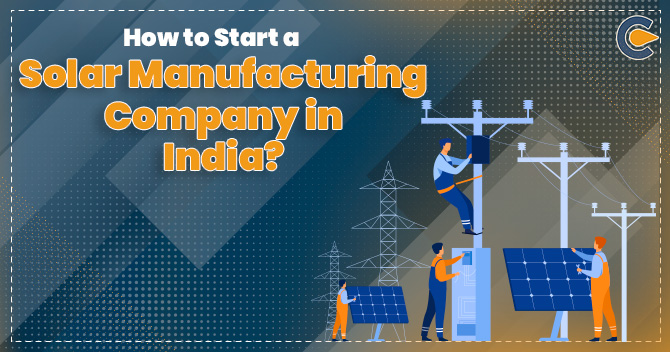With the increase in the consumption of electricity globally, the importance of sustainable sources has also increased. In India, both the State and Central Governments have planned and launched various schemes, offers & techniques that encourage more & more people to indulge in the adoption of solar energy. One of the biggest and most widely used renewable sources is solar energy and taking worldwide data into account, it’s said that India is the third-largest solar market in the entire world. If you are planning to start s Solar Manufacturing Company in India, then this blog will be a complete guide for you. Scroll down to check some vital points that one must consider while starting a Solar Manufacturing Company in India.
What is Solar Business?
In this business, companies manufacture or produce products that are related to Solar Energy like solar inverters, solar batteries, etc. These products don’t just help to conserve the environment, but they also decrease your energy usage, making things economically good or beneficial for you and your family. The primary purpose behind the usage of this product is to lessen the use of consumable energy.
There are different types of Solar Businesses and you can check the same below:
- Solar INC: This solar business is related to doing the groundwork or the installation work that is vital. Usually, they are in the contractor form, often tied up with Solar EPC.
- Solar EPC: EPC stands for Engineering, Procurement & Construction. A business that is into Solar EPC would get the vital solar materials from a manufacturer, do the engineering work & provide the installation and post-installation services to the customers.
- Solar Consulting Business: A business owner putting in a big project concerning the Solar industry would require some consultation for an experienced opinion. In such instances, they hire a Solar Energy Consultant who would handle the entire project.
- Solar Manufacturers: Manufacturers who produce solar products or items that are further bought & used by the Solar EPC businesses. This generally includes materials that are needed for Solar Projects.
What are the Different Sectors to Start a Solar Manufacturing Company in India?
Now let’s understand the different sectors to start a Solar Manufacturing Company in India:
- Sales or Marketing Sector: The marketing sector does not require big investment but skills & knowledge. You should have skills in generating leads & converting them to customers.
- Manufacturing Sector: The first is sector is the manufacturing sector, where products and accessories are manufactured. The manufacturing sector requires huge investment as you have to buy machines to manufacture the product, the land required to establish the factory, the workers’ salary, etc.
- Service Sector: This sector comprises repair, maintenance, installation, etc. You need to have solar knowledge and a team as it comprises tasks like maintenance, installation, etc.
Investment required for Commencing Solar Business in India
It totally depends on the type of solar business you choose; your investment would vary. A Manufacturer of solar panels or solar inverters would require a greater investment; a business concerning solar installers would cost you less investment. Moreover, if we were to take into account an average investment that would be needed for the solar business in India, then it would be around Rs. 1 to 3 lakhs.
Steps to Start a Solar Manufacturing Company or Business in India
Following are the steps to start a Solar Manufacturing Company or Business in India:
Step 1: Create an Effective Business Plan: Before entering into any business, it is an essential and preliminary task to ensure the healthy growth and dedicated financial flow of a business. Planning the business course comprises managing the investment sectors[1], arranging truly to source raw materials, business strategies, providing training, contacting manufacturers, arranging teams, lactating the perfectly suited properly, assembling needed equipment, sales techniques, strategizing marketing, and many more.
Commencing a business requires a lot of capital funding in its starting stages which in turn will need external financial support. To make sure the steady flow of finance and in an estimated method. It’s always best to take business loans, and there are various financial institutions, both public & private, NBFCs, banks, Small & Micro Finance Banks, Rural and Regional Banks, MSME Loans and many more that provide a good loaning scheme with suitable tenures and interest rates to new businesses, entrepreneurs.
Step 2: Researching: Researching all the elements of the particular field of business. In this instance, the companies associated, the source of materials, the best deals, the offers provided by the Government, the legalities, the opponents, the marketing plans and the targeted sectors & customers all play a vital role in giving a perfect shape to the business and also introduces the owner to all the risks & problems linked with business, if any.
Step 3: Authorising & Legitimising Business: Under the Companies Act, 2013, a business should be registered as a company under the following terms:
- Private and Public Company
- One Person Company
- Limited Liability Partnership or LLP
- Proprietorship Firm
- Partnership Firm
It’s vital to be aware of the functionalities & limitations of each form. Before registering a business, it is vital to choose a name of the same. A business name should be associated with the idea or motto of the business with the service it provides
The documents required based on the type of company one is applying or registering for are:
- Incorporation Certificate;
- Proof of registered office;
- DSC or Digital Signature Certificate;
- MOA (Memorandum of Association) and AOA (Articles of Association);
- Shop & Establishment Act License;
- Consent of Director as an Affidavit;
- Sales Tax & TIN Information;
- GST Registration;
- Trade License;
- DIN or Director Identification Number;
- Certificate of Commencement;
- Aadhar Card.
Step 3: Stay Updated with Electricity Department: As the Government of India is making efforts to involve as many customers as possible in availing the solar business sources, it’s vital to stray updated with the electricity department of the State Government, which will save a lot of money and efforts. Alongside, various lucrative schemes that profit both customers & sellers are something one must always be on the lookout for. Nevertheless, it is not necessary to mention that having good connections with the authorities is always beneficial for the business with quick processing times in various complex problems when the need arises.
Step 4: Choose the Location: The business location is prima facie of its considerable growth. Connectivity plays the most vital role in terms of recognition, accessibility & faster service. Further, in areas with higher rainfall, solar energy businesses might not reach their prime. The environment plays a vital role in the success of these businesses. Hence, one should find a location where the sunlight appears all throughout the year for current & future electricity generation.
Step 5: Finance Management: The financial aspect of a business are the most pivotal factor in its growth. A clear estimation of the expenditure, outcomes, profit or loss generation, and incomes is how a business can flourish or gush down the river. Here are the main factors that require prime attention:
- Availability of tools;
- Legal Expenditures;
- Infrastructural expenditures;
- Educational Programs & Training Expenditures;
- Raw Materials & Purchase Expenditures;
- Workers or Labourers/Employee’s Expenditure;
- Marketing & Advertising Expenditures;
- Space, Peripheral, or Land Expenditures and Taxes;
- Commissionable & Company Benefits Aspects;
- Maintenance Expenditures;
- Machinery or Equipment Expenditures.
Step 6: Hiring the Perfect Team: When running a business, especially while starting one, it’s vital to be selective & choose employers who have the passion for fighting & knowledge to survive. In a technical line, acquired knowledge & educational background play a key point in business development.
Ineffectiveness can lead to disasters even when every other element of the business stands perfect. Job efficiency, customer service, and suitable professional behaviour, along with maintaining a consistent, friendly relationship between the customers and the company, are vital. It not just strengthens the brand name but also ensures a huge profit for the company both in the present & future ventures.
Conclusion
The solar energy business is a thriving industry and has got many scopes & opportunities. There is a heavy demand for it in industrial & agricultural sectors as power cuts and frequent load-shedding are potentially intimidating & pose huge damage. You can start a solar manufacturing company in the different states of India. Therefore, for growth opportunities and huge profits, you can easily start a solar manufacturing company in India.
Read our Article:How to Secure Petrol Pump License in India?











